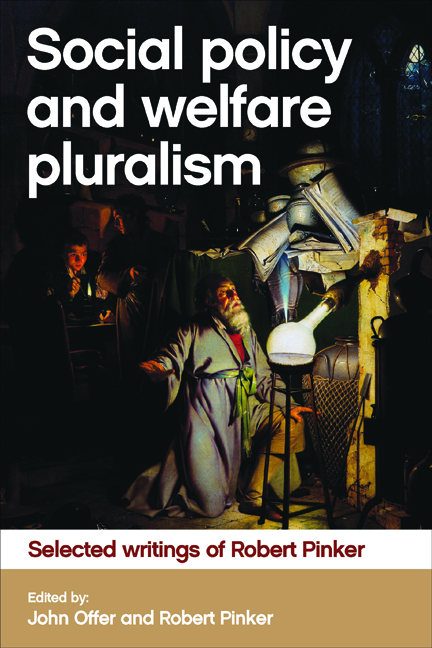Book contents
- Frontmatter
- Contents
- Acknowledgement
- Preface
- General introduction: Robert Pinker on rethinking approaches to welfare
- Introduction to Part One On social policy studies
- one The ends and means of social policy: a personal and generational perspective
- two Social theory and social policy: a challenging relationship
- three Stigma and social welfare
- four The welfare state: a comparative perspective
- five Richard Titmuss and the making of British social policy studies after the Second World War: a reappraisal
- Introduction to Part Two On social care, communities and the conditions for well-being
- six Report of the Working Party on the Role and Tasks of Social Workers: an alternative view
- seven The quest for community: from the Settlement Movement to the Griffiths Report: an historical perspective
- eight Citizenship, civil war and welfare: the making of modern Ireland
- Introduction to Part Three On welfare pluralism
- nine Golden Ages and welfare alchemists
- ten From gift relationships to quasi-markets: an odyssey along the policy paths of altruism and egoism
- eleven The experience of citizenship: a generational perspective
- twelve The right to welfare
- thirteen The prospects for social policy in the UK after the 2015 General Election
- Afterword On the post-Brexit prospects for social policy in the UK
- References
- Index
Introduction to Part One - On social policy studies
Published online by Cambridge University Press: 08 April 2022
- Frontmatter
- Contents
- Acknowledgement
- Preface
- General introduction: Robert Pinker on rethinking approaches to welfare
- Introduction to Part One On social policy studies
- one The ends and means of social policy: a personal and generational perspective
- two Social theory and social policy: a challenging relationship
- three Stigma and social welfare
- four The welfare state: a comparative perspective
- five Richard Titmuss and the making of British social policy studies after the Second World War: a reappraisal
- Introduction to Part Two On social care, communities and the conditions for well-being
- six Report of the Working Party on the Role and Tasks of Social Workers: an alternative view
- seven The quest for community: from the Settlement Movement to the Griffiths Report: an historical perspective
- eight Citizenship, civil war and welfare: the making of modern Ireland
- Introduction to Part Three On welfare pluralism
- nine Golden Ages and welfare alchemists
- ten From gift relationships to quasi-markets: an odyssey along the policy paths of altruism and egoism
- eleven The experience of citizenship: a generational perspective
- twelve The right to welfare
- thirteen The prospects for social policy in the UK after the 2015 General Election
- Afterword On the post-Brexit prospects for social policy in the UK
- References
- Index
Summary
Pinker's best known book is Social Theory and Social Policy, published in 1971. Its primary task was to review the problematic assumptions and methods in the study of social policy which Pinker found in the new academic subject of what was then called ‘social administration’. Later, in 2000, Pinker gave a lecture offering a bird’s-eye view of some of the formative influences he experienced as a Research Officer and student from the mid-1950s at the London School of Economics, which gave him his abiding interest in the broad field of social policy studies. The same lecture also introduced some of the chief research concerns which were to occupy him when he launched himself on his subsequent career in academic life. It does seem appropriate, therefore, that this lecture, ‘The ends and means of social policy: a personal and generational perspective’, should, in this selection of Pinker's writings, substitute for the full elaboration of his ideas which Social Theory and Social Policy provides. So we have placed it first as Chapter One in this selection. It provides a basic context in which all the other material included in this volume can be located.
As far as the discussion in this first chapter is concerned, neither Pinker nor those whom he was criticising were particularly wedded to the expression ‘the Welfare State’ as an attempt to describe the nature of what they were studying. Both Pinker and Richard Titmuss considered that this expression was so lacking in clear meaning that it should be only introduced into analysis to be discarded as unfit for purpose (the origins of and difficulties with the expression ‘the welfare state’ are extensively discussed in Veit-Wilson, 2000 and Wincott, 2003, 2015). However, for Pinker, there was a particular difficulty about the meaning of the idea of ‘welfare’ itself, which he felt was being taken for granted and thus left unexamined in the academic subject's own deliberations. In place of a focus on building up pictures of ‘need’ as theorised and met in everyday life, and how in interactions between people, the nature of what was to be accepted as ‘wellbeing’ was routinely negotiated and accomplished, the subject itself was in effect imposing on social reality an interpretation of what it believed ‘welfare’ and associated ideas ought to be taken to mean.
- Type
- Chapter
- Information
- Social Policy and Welfare PluralismSelected Writings of Robert Pinker, pp. 25 - 34Publisher: Bristol University PressPrint publication year: 2017

